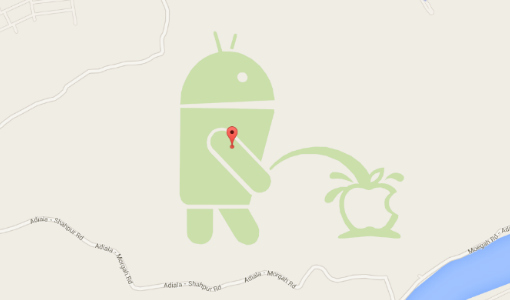 Have you ever wondered where, exactly, Google Maps gets all its information? The Google camera car maps out plenty of routes, but a lot of data comes from private citizens, too. Google has a team of volunteers that help complete maps in hard-to-reach areas, and it lets business owners fill in data about their own establishments. In fact, just about anyone can provide Google with data – and that’s causing some very ugly problems for the company.
Have you ever wondered where, exactly, Google Maps gets all its information? The Google camera car maps out plenty of routes, but a lot of data comes from private citizens, too. Google has a team of volunteers that help complete maps in hard-to-reach areas, and it lets business owners fill in data about their own establishments. In fact, just about anyone can provide Google with data – and that’s causing some very ugly problems for the company.
This past week, a user of the Twitter social network posted a screenshot of an actual Google Maps search for “(n-word) house” that returned The White House as a result. Another Twitter user performed a search for “(n-word) university” and was served a listing for Howard University, a historically black college. Plenty more people were able to reproduce and share the racist glitch, as well.
Google, of course, quickly went to work to scrub this garbage from its database. “Some inappropriate results are surfacing in Google Maps that should not be, and we apologize for any offense this may have caused. Our teams are working to fix this issue quickly,” a company spokesperson said. (Google Maps no longer returns any results for these searches when attempted.)
It’s not immediately clear how the racist term got attached to The White House’s Google Maps listing. In the past, pranksters have added fake Google Maps listings – one person recently discovered park in Maps shaped like Google’s Android mascot peeing on the Apple logo. But this problem seems to go beyond the basic level of "prank." Google’s algorithms may have inadvertently applied “machine learning” to hate speech here, not knowing how offensive it’d be to do so. Which means it may suffer a similar inappropriate association in the future.
Twitter, too, just had its own run in with unchecked hate speech. Recently, a troll hijacked an Australian feminist’s identity and paid to promote a series of brutal anti-transgender comments. The offending tweets, which called for readers to commit suicide, appeared in multiple people’s timelines as advertisements. They were pulled only after they began running, long after the damage had already been done.
Is there a way to stop this kind of hurtful nonsense from appearing on the web? That may be a bit too much to ask – hate speech has always been a marginalized part of the Internet, and much of it is rightfully protected by the First Amendment. Still, Google and Twitter are major corporations, and have a responsibility to keep their platforms from being weaponized by racists. If Google Maps is smart enough to explain why you’re sitting in traffic, it should be smart enough not to associate The White House with the n-word without a public outcry.
[Image credit: Google]

















